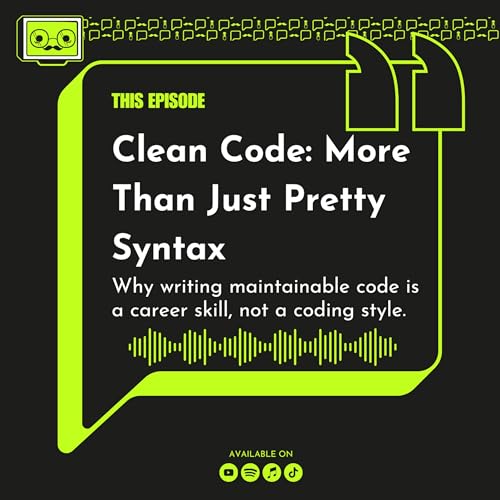
104 - Clean Code: More Than Just Pretty Syntax
No se pudo agregar al carrito
Add to Cart failed.
Error al Agregar a Lista de Deseos.
Error al eliminar de la lista de deseos.
Error al añadir a tu biblioteca
Error al seguir el podcast
Error al dejar de seguir el podcast
-
Narrado por:
-
De:
Why writing maintainable code is a career skill, not a coding style.
On this episode, we have Alex, Christopher Bryan, Charles Mejica Madronero, and Edd Alc joining us to discuss clean code and why writing maintainable code is a career skill, not just a coding style.
Clean code isn’t about perfection—it’s about clarity, maintainability, and collaboration. In this episode, we talk to developers who prioritize writing code that other people (including their future selves) can read, debug, and scale. We’ll unpack why clean code matters beyond job interviews, how it impacts teams and long-term projects, and the habits that separate average coders from great ones over time.
What’s your personal definition of clean code? (Generalization)
My personal definition of clean code is code that is easy to read, easy to understand, and easy to change. It’s code that tells a story, so that another developer can look at it and immediately grasp its purpose without excessive comments. It’s also code that has a clear structure and organization, making it predictable and simple to navigate. Essentially, it's code that prioritizes the human reader over the machine.
Have you ever had to clean up someone else’s messy codebase? What was that like? (Generalization)
Absolutely. Cleaning up a messy codebase is a common rite of passage for many developers. It can be a very challenging and frustrating experience, much like trying to untangle a massive knot of string. The process often involves a lot of detective work to understand the original intent of the code, and a significant amount of time spent on refactoring and writing tests to ensure changes don't break existing functionality. While difficult, it's also a powerful learning experience that highlights the importance of good code hygiene.
What small habits help you write cleaner, more maintainable code every day? (Generalization)
A few small habits make a big difference. I always aim to use descriptive variable and function names so their purpose is immediately clear. I also try to keep functions small and focused on a single task, following the Single Responsibility Principle. Additionally, I’m a firm believer in automated testing; a good suite of tests acts as a safety net that allows me to refactor and improve code confidently without fear of introducing new bugs.
Is there ever a time when writing clean code is not the priority? (Generalization)
Yes, there are rare situations where clean code is not the top priority. This most often happens in a crisis or emergency, such as when a critical system is down and needs to be fixed immediately. In such cases, the priority is to get the system working again as quickly as possible. Similarly, during a rapid prototyping or proof-of-concept phase, a developer might prioritize speed and functionality to validate an idea. However, in these situations, it's crucial to acknowledge the "mess" and plan to refactor it later to avoid long-term technical debt.


